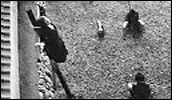Hitokiri
- Year
- 1969
- Original title
- Hitokiri
- Japanese title
- 人斬り
- Alternative title
- Tenchu
- Director
- Cast
- Running time
- 140 minutes
- Published
- 28 January 2005



by Tom Mes
The downfall of the Tokugawa shogunate in the early second half of the nineteenth century is one of the more dramatic periods in Japan's history. Though inevitable - it was brought upon by the very structure of the feudal system installed by the Tokugawa - numerous forces resisted it, some out of loyalty to the shogun, others to protect the archipelago from the foreign invaders on its doorstep. Yet others tried to profit from the winds of change that were blowing, hoping to further their own positions of power. They saw the imminent restoration of the emperor's reign as merely a reshuffling of the feudal cards and believed that regardless of who was ultimately at the head of it, the social structure of lords and domains would remain the same.
Hideo Gosha's Hitokiri is set against the background of such profiteers, in particular the Tosa Loyalist Party headed by Hanpeita Takechi (portrayed by Gosha regular Nakadai). Though officially fighting on the side of such revered modernist reformers as Saigo Takamori and Ryoma Sakamoto (the latter played here by former Nikkatsu matinee idol Yujiro Ishihara), Takechi followed his own agenda, using a squad of stealthy samurai assassins as his main weapon to eradicate his enemies, which included those who were officially his allies.
One of his most effective servants to this scheme was Izo Okada, a ronin of Tosa stock, and childhood friend of Sakamoto, who joined Takechi's private army to escape poverty. The third film to dramatise his life story, Hitokiri follows Okada's (Katsu, who also produced) induction into the Loyalist ranks, where he is soon basking in the glory of his murderous deeds. He takes to his new vocation with glee, racking up the body count and spreading the reputations of both himself and his master far beyond the borders of Kyoto, their base of operations.
In what is perhaps his stylistic triumph (no one has rivalled this director's ability to compose with muted colours and earth tones), Gosha portrays Okada's ascension as pure decadence: a man living above his status without the slightest sense of humility. Naïve stupidity plays a major part in his psychological make-up; as he revels in his newfound fame, he fails to see that he is merely being used, a pawn in Takechi's chess game, or a dog, as his old friend and would-be saviour Sakamoto puts it.
This condemnation of arrogance is central to the way Gosha approaches the actions of Takechi and his ilk, for whom loyalty to the emperor is merely a front. The abuse of the cry of "Tenchu!" (divine punishment) as a devious way for the assassins to overwhelm their victims before the kill, is emblematic. As the film progresses and Nakadai's character grows increasingly determined in the face of mounting adversity to his deeds, a parallel with the military leadership that headed Japan in World War II becomes apparent in the willingness to sacrifice everyone and everything for an abstract notion of victory.
Izo Okada is given some respite from this, however. His foolishness also humanises him, as the more comic situations that evolve from his thick-headedness show. In Gosha and Katsu's portrayal of the character, there is always a sense of compassion for a simple soul swept away by powers beyond his control and comprehension. Throughout, he is defined through the contrast he forms with Ryoma Sakamoto: clumsy, boorish, unkempt country boy versus the latter's unwavering air of determined sophistication. But his lowly status never serves as an apology; Okada learns humility before paying for his crimes.
Although the narrative closely follows the giri-ninjo tradition (represented by master Takechi and friend Sakamoto respectively), Hitokiri manages to rise above the plot machinations in a way that some of Gosha's later films (like the Nakadai starrer The Wolves) don't. Furthermore there is the stellar cast, which includes Mitsuko Baisho as Okada's prostitute girlfriend Omine and author Yukio Mishima as Shinbei Tanaka, his rival in the assassination stakes whose end is suitably Mishima-esque. Resonant and meaningful, and being so without moving into the heavy metaphors and symbolism of Takashi Miike's later Izo (2004), Hideo Gosha's Hitokiri remains the ultimate portrayal of Izo Okada, but above all an enthralling film in its own right.